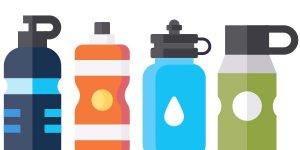Getting Started with Anticancer Living
Author: Jenny Bradley
Taking steps toward anticancer living can feel daunting. Emotions are already charged, energy feels quickly depleted, and life suddenly has an entire new curriculum as you deal with everything that comes along with a cancer diagnosis. As a cancer patient myself, I am very familiar with those challenges and I too felt overwhelmed in the beginning. If I can pass along any advice, it would be this:
JUST GET STARTED.
When faced with a cancer diagnosis, diving head first into major lifestyle changes might feel necessary, but also very cumbersome when added to the multitude of things we are already dealing with. However, reframing the way we view it can make all the difference. Rather than viewing the change as a daunting overhaul, view them as a progressive journey of small helpful & healthful steps.
Major lifestyle changes don’t necessarily happen all at once and last forever. Nor do most of us have all the necessary resources to overhaul our entire life at one time. (Can I get an amen?!) The first month after I was diagnosed with breast cancer, my husband and I made a list of priorities that we could modify. We based our decisions on the insights from my lab work and the Riordan Clinic team input. We also considered what other patients who were farther along on their healing journey deemed helpful.
We didn’t try to change everything all at once. We first focused on the things we consumed.
 The first starting point was to be intentional about what we consumed with our eyes and ears.
The first starting point was to be intentional about what we consumed with our eyes and ears.
I stopped watching 24-hour news channels, listening to things that weren’t edifying or didn’t make me smile, and quit following social media accounts that would cause me to feel fight or flight emotions and responses.
This also helped me learn to tune into my body and listen to the cues my own cells gave me in responding to outside stimuli.
Next, we focused on what we were eating and drinking.
After reading the EPA’s testing results on our local water supply and learning about the importance of hydration for detoxification and healing, we decided that purified, clean drinking water was a foundational piece of the anticancer lifestyle. We agreed purified water was a top priority, so we allocated resources and purchased a countertop purifier for drinking and cooking water.
 Next, we worked to shift our food and drink containers to safer, less toxic vessels.
Next, we worked to shift our food and drink containers to safer, less toxic vessels.
This meant opting for glass and stainless steel containers instead of plastic (plastic can leach chemicals into our food & drink that can harm us).
I made the choice to never leave the house without my stainless steel tumbler of purified drinking water. If you see me around Riordan Clinic, you’ll most likely see me with a tumbler of water in hand! We started saving glass jars to wash and reuse and bought an inexpensive bundle of glass containers with lids.
Working on getting safer containers also meant switching to safer cookware and bakeware.
We got rid of older non-stick coated pots and pans as some of the chemicals used in non-stick coatings have been linked to cancer.
We did not go switch out everything in our kitchen all at once. We made a prioritized list, invested in the important-to-us pieces first, and upgraded the other items as the months went on.
The same can be said about modifying our diet. We did not come home one day and throw everything away and usher in an entirely new pantry and refrigerated stock all at once. Instead, we started with choosing more organic and plant-focused foods.
 We learned about how pesticides (including herbicides, insecticides, rodenticides, and fungicides) can create hormone disruption and cause various harmful effects in the body.
We learned about how pesticides (including herbicides, insecticides, rodenticides, and fungicides) can create hormone disruption and cause various harmful effects in the body.
As someone dealing with a hormone-driven cancer, I did not want my body to work any harder on balancing my hormones. I wanted my body working on the cancer, not on working overtime to detox the various harms carried in on the food I was eating.
While the organic label does not mean toxin-free, it does hold a higher standard for what kinds of farming practices are used in the breeding, cultivating, and harvesting process, thus creating a less harmful end product for the consumer.
As we went grocery shopping each week for fresh produce, we intentionally geared our meal plan to be more plant-focused in order to help fill our bodies with nourishment to use in the healing process.
Cruciferous vegetables like broccoli, cauliflower, cabbage, and brussels sprouts quickly became feature items on our plates. Known for their anticancer compounds, these powerhouse vegetables along with garlic, onions, mushrooms, berries, turmeric, and ginger became weekly staples in the shopping cart.
You can read more about the anticancer grocery list in a previous article: riordanclinic.org/2021/05/foods-to-include-in-an-anti-cancer-diet
Our outlook on food consumption became more about intentionally nourishing our bodies and less about restriction. It wasn’t about eliminating all the things we used to enjoy. It was about making choices that help support the healing mechanisms our bodies already have in place!
Taking steps toward anticancer living can be a progressive journey, and it doesn’t require the perfect plan. You don’t have to throw away everything in your pantry all at once, get rid of all your personal care products, and never enjoy ice cream again. Instead, focus on making intentional choices every single day that foster a healing environment in and around you.
PROGRESS over perfection.
Jenny Bradley has been thriving with a cancer diagnosis since 2017. She is a Certified Culinary Nutrition Expert and Certified Holistic Cancer Coach who helps guide overwhelmed cancer patients into more peace through her coaching and courses at shrinkthemutantschool.com. You can find her sharing her cancer thriver insights and inside scoop on her Instagram @shrinkthemutant. Jenny is married to her favorite supporter, Mike. They live in Kansas with their cute little dog named Poppy.





